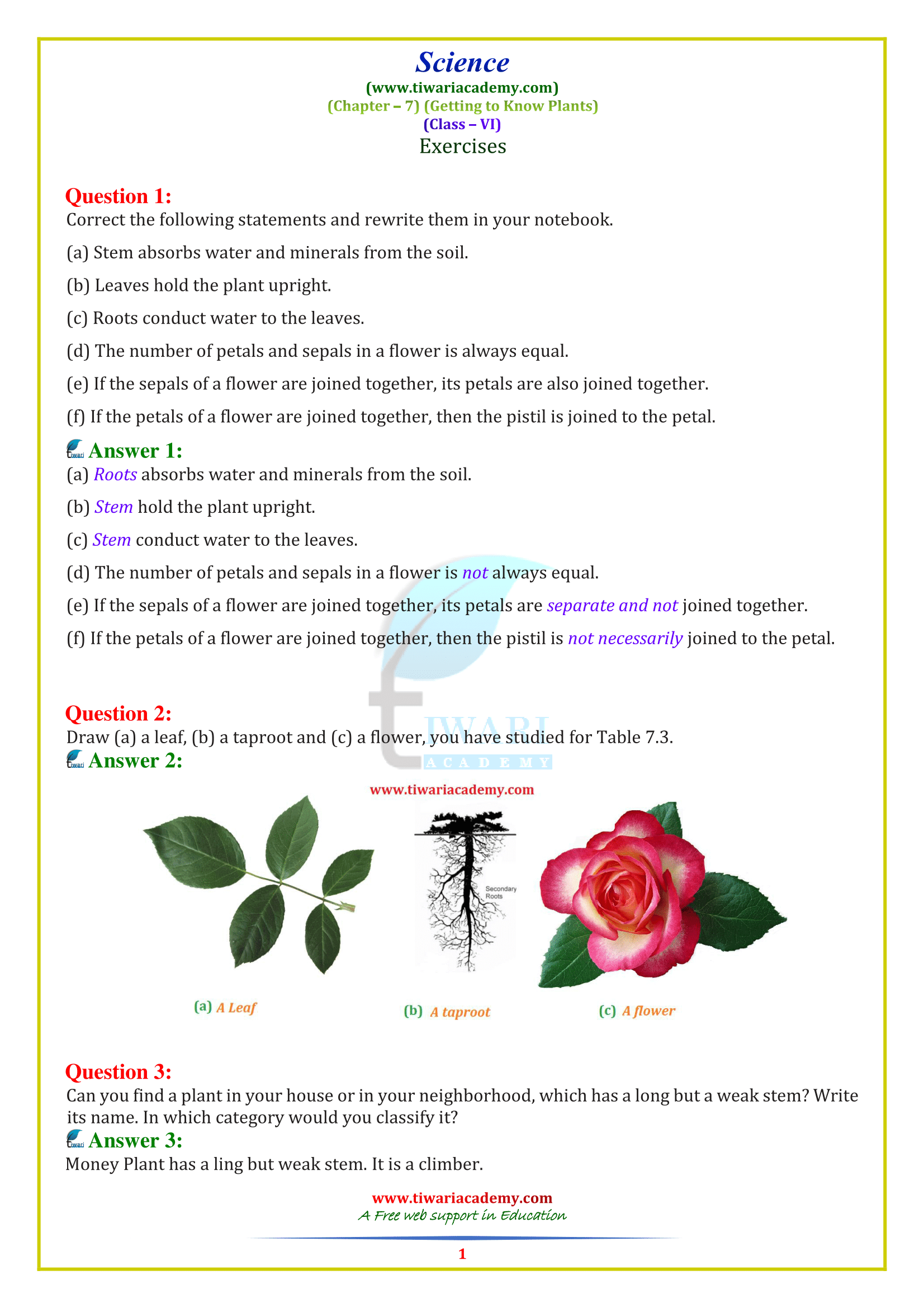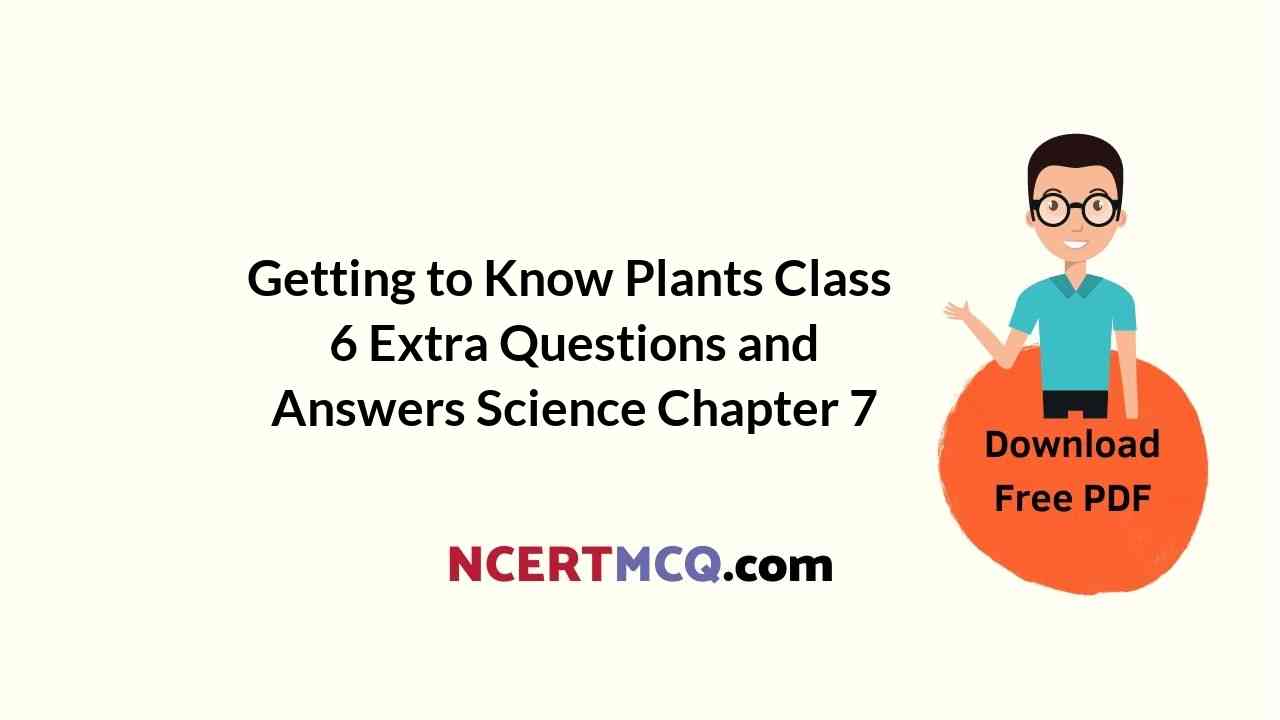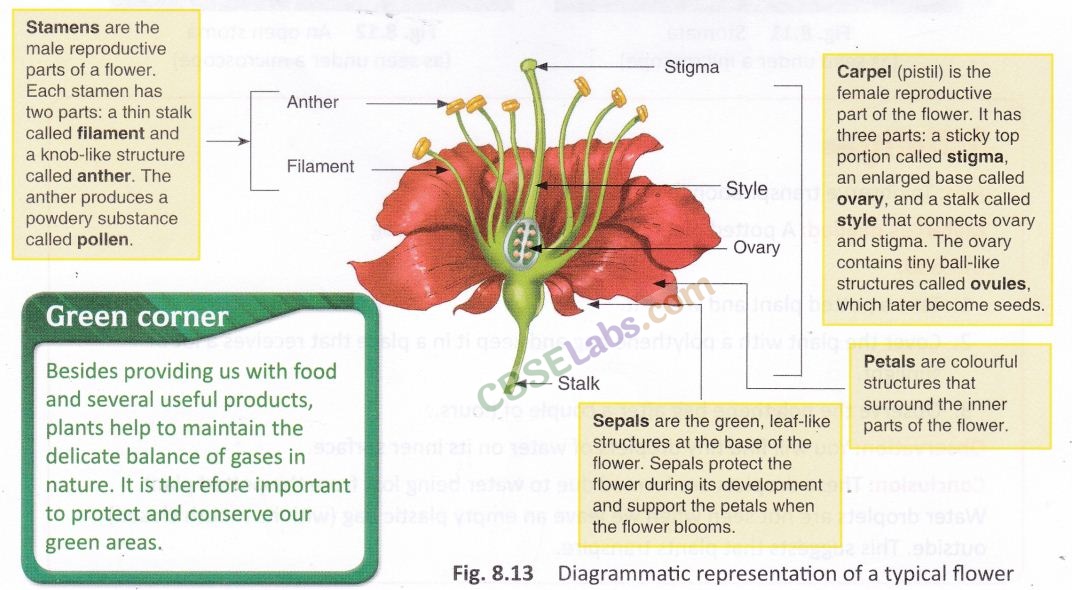
Class 6,getting to know plants YouTube
Ans. The loss of water by plants through stomata is called Transpiration. Q5. What part of plant is called food factory? Why are they so called? Ans. Leaves are called food factories of plant.They are so called because they are the places where photosynthesis happens. Q6. Name the two systems of flowering plant. Ans.

NCERT Solutions for Class 6 Science Chapter 7 Getting to Know Plants
Class 6 Science Getting to Know Plants Worksheets with Answers Chapter 7 - PDF 1. True/false: a. All plants are of same size. Answer: False b. Photosynthesis takes place in the absence of light. Answer: False c. Transpiration and Photosynthesis are the main function of leaf. Answer: True d. Roots hold the plant above the soil. Answer: False e.

Getting to Know Plants, Part 1, Class 6, Science, NCERT CBSE YouTube
Install Now CBSE worksheets for Getting To Know Plants worksheet for class 6 in PDF for free download. Science worksheets for class 6 CBSE includes worksheets on Separation of Substances as per NCERT syllabus. CBSE class 6 worksheets as PDF for free download Getting To Know Plants worksheets.

Getting to know plants class 6th Science ncert chapter 7 YouTube
Practice MCQ Questions for Class 6 Science with Answers on a daily basis and score well in exams. Refer to the Getting to Know Plants Class 6 MCQs Questions with Answers here along with a detailed explanation. Getting to Know Plants Class 6 MCQs Questions with Answers. Choose the correct option.
CBSE Class 6 Science Getting to Know Plants MCQs, Multiple Choice Questions
This worksheet covers a range of topics, from identifying different types of plants, their features and how they grow. Print out this free worksheet and use it with your students for a fun and educational activity. Getting to Know Plants Class 6: A Beginner's Guide to Plant Science. Click to download Notes, MCQs and Extra Q&A.

Getting To Know Plants Class 6 Science
Solution: a) Roots absorb water and minerals from the soil. b) Stem holds the plant upright. c) Stems conduct water to the leaves. d) The number of petals and stamens in a flower may not always be equal. e) If the sepals of a flower are joined together, its petals are separate.

Getting to know plants class 6 science (Part 3) YouTube
Assignment based on NCERT Chapter for Class 6 Q1: Answer the following in one word or one sentence each: (a) We often see in our homes or in neighbourhood some plants that have long but weak stems and crawl on ground. What are these plants called? Give an example of such a plant. _____ (b) Some plants grow in our neighbourhood have medicinal.

class 6 components of food interactive worksheet 1st qtr quiz no 1 grade 6 science worksheet
Download Lakhmir Singh Class 6 Science Chapter 7 Getting To Know Plants Worksheet Free PDF. Our planet is home to so many plants and animals. There are millions of plant species identified in the world living in different ecosystems. Class 6 Science Chapter 7 focuses on giving a basic idea about different kinds of plants and introducing.

Flower And Leaf Structure Worksheet Answers Best Flower Site
In this page we have Practice Worksheets for Class 6 Science Chapter 7 Getting to know plants . Hope you like them and do not forget to like , social share and comment at the end of the page. Question 1 State True or False (a) If a plant has fibrous root, then leaves will show parallel venation.

(PART1) Getting To Know Plants / Class6 SCIENCE NCERT Chapter 7 हिन्दी Explanation ByKV
Class 6 Science students should refer to the following printable worksheet in Pdf for Chapter 7 Getting to Know Plants in Class 6. This test paper with questions and answers for Class 6 will be very useful for exams and help you to score good marks Class 6 Science Worksheet for Chapter 7 Getting to Know Plants Multiple Choice Questions Question.

Class 6 science chapter 7 Getting to Know Plants Class 6 Science getting to know plants
Open the Selfstudys website. Bring the arrow towards the CBSE which can be seen in the navigation bar. A drop down menu will appear, select KVS NCERT CBSE Worksheet. A new page will appear, Class 6 from the list of classes. Click Science from the list of subjects.

Getting to know plants class 6 science chapter 7 animated video in hindi with full explanation
CBSE Class 6 students looking to have a proper understanding of the concepts discussed in the chapter Getting To Know Plants can easily avail Worksheets with Answers in PDF format to download. They are prepared by expert teachers in science by strictly following and adhering to the latest edition of CBSE (NCERT) books.

Getting to Know Plants Class 6 Extra Questions and Answers Science Chapter 7 NCERT MCQ
(A) Root system (B) Shoot system (C) Any of these Identify the type of roots present in it. (A) Fibrous roots (B) Tap roots (C) None of these In plants like radish, carrot, sweet potato etc., the roots are modified and the extra food is stored inside it.

Getting to know plants Class 6 Science CBSE ICSE FREE Tutorial YouTube
Science - Class 6 (Chapter 01-10) Chapter 7 - Getting to Know Plants - 1; Getting to Know Plants Worksheet 1; Getting to Know Plants Worksheet 1. Download to practice offline.. Next activity Getting to Know Plants Worksheet 2. Jump to. Disclaimer. All contents provided by us are based on best of our knowledge..

Getting To Know Plants Class 6 Science Part 2 Youtube Otosection
Getting to know plants Getting to know plants Parameswari Member for 2 years 4 months Age: 10-11 Level: grade 6 Language: English (en) ID: 1132527 30/06/2021 Country code: IN Country: India School subject: Science (1061951) Main content: Plants (2012966) Getting to know plants test Other contents: PLANTS IMPORTANCE Loading ad.

Getting to Know Plants Class 6 Notes Science Chapter 7 Estudiar.live
Read and download free pdf of CBSE Class 6 Science Getting To Know Plants Worksheet Set G. Students and teachers of Class 6 Science can get free printable Worksheets for Class 6 Science Chapter 7 Getting to Know Plants in PDF format prepared as per the latest syllabus and examination pattern in your schools.